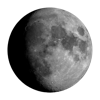Sirius - α Canis Majoris (alpha Canis Majoris)
Sirius, also designated as α Canis Majoris (alpha Canis Majoris), is a multiple main-sequence star of spectral class A1 in the constellation of Canis Major.
Sirius visual magnitude is -1.46. Because of its brightness, Sirius is clearly visible to the naked eye when observed from locations with dark skies, and should be also quite easily visible from light polluted areas.

Celestial Coordinates
Apparent
J2000
Galactic Coordinates
Finder Chart

Magnitude, Color, Spectral Class
The red dot in the diagram below shows where Sirius is situated in the Hertzsprung–Russell diagram.

Star System Properties
Sirius is a visual double star which can be observed only with the help of very large telescopes. The table below shows key information about the Sirius double sysyem:
Distance, Radial Speed, Proper Motion
Sirius is distant 8.60 light years from the Sun and it is moving towards the Sun at the speed of 8 kilometers per second.
Alternative Designations
Visibility from Your Location
Today's Sirius - α Canis Majoris (alpha Canis Majoris) rise, transit and set times from Labejum, Germany are the following (all times relative to the local timezone Europe/Berlin):









